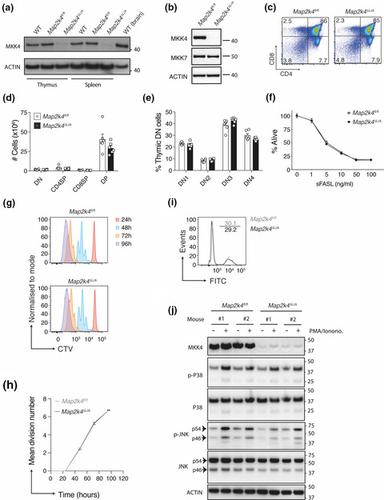当前位置:
X-MOL 学术
›
Immunol. Cell Biol.
›
论文详情
Our official English website, www.x-mol.net, welcomes your feedback! (Note: you will need to create a separate account there.)
The role of MKK4 in T‐cell development and immunity to viral infections
Immunology and Cell Biology ( IF 4 ) Pub Date : 2020-11-11 , DOI: 10.1111/imcb.12426 Simon P Preston 1, 2 , Marcel Doerflinger 1, 2 , Hamish W Scott 1 , Cody C Allison 1, 2 , Miles Horton 1, 2 , James Cooney 1, 2 , Marc Pellegrini 1, 2
Immunology and Cell Biology ( IF 4 ) Pub Date : 2020-11-11 , DOI: 10.1111/imcb.12426 Simon P Preston 1, 2 , Marcel Doerflinger 1, 2 , Hamish W Scott 1 , Cody C Allison 1, 2 , Miles Horton 1, 2 , James Cooney 1, 2 , Marc Pellegrini 1, 2
Affiliation

|
The stress‐activated protein kinases (SAPKs)/c‐Jun‐N‐terminal‐kinases (JNK) are members of the mitogen‐activated protein kinase family. These kinases are responsible for transducing cellular signals through a phosphorylation‐dependent signaling cascade. JNK activation in immune cells can lead to a range of critical cellular responses that include proliferation, differentiation and apoptosis. MKK4 is a SAPK that can activate both JNK1 and JNK2; however, its role in T‐cell development and function has been controversial. Additionally, loss of either JNK1 or JNK2 has opposing effects in the generation of T‐cell immunity to viral infection and cancer. We used mice with a conditional loss of MKK4 in T cells to investigate the in vivo role of MKK4 in T‐cell development and function during lymphocytic choriomeningitis virus (LCMV) infection. We found no physiologically relevant differences in T‐cell responses or immunity to either acute or chronic LCMV in the absence of MKK4.
中文翻译:

MKK4 在 T 细胞发育和病毒感染免疫中的作用
应激活化蛋白激酶 (SAPKs)/c-Jun-N-末端激酶 (JNK) 是丝裂原活化蛋白激酶家族的成员。这些激酶负责通过磷酸化依赖性信号级联转导细胞信号。免疫细胞中的 JNK 激活可导致一系列关键细胞反应,包括增殖、分化和细胞凋亡。MKK4 是一种 SAPK,可以同时激活 JNK1 和 JNK2;然而,它在 T 细胞发育和功能中的作用一直存在争议。此外,JNK1 或 JNK2 的缺失在产生针对病毒感染和癌症的 T 细胞免疫方面具有相反的作用。我们使用在 T 细胞中条件性丢失 MKK4 的小鼠来研究体内MKK4 在淋巴细胞性脉络丛脑膜炎病毒 (LCMV) 感染期间在 T 细胞发育和功能中的作用。我们发现在没有 MKK4 的情况下,T 细胞反应或对急性或慢性 LCMV 的免疫没有生理相关差异。
更新日期:2020-11-11
中文翻译:

MKK4 在 T 细胞发育和病毒感染免疫中的作用
应激活化蛋白激酶 (SAPKs)/c-Jun-N-末端激酶 (JNK) 是丝裂原活化蛋白激酶家族的成员。这些激酶负责通过磷酸化依赖性信号级联转导细胞信号。免疫细胞中的 JNK 激活可导致一系列关键细胞反应,包括增殖、分化和细胞凋亡。MKK4 是一种 SAPK,可以同时激活 JNK1 和 JNK2;然而,它在 T 细胞发育和功能中的作用一直存在争议。此外,JNK1 或 JNK2 的缺失在产生针对病毒感染和癌症的 T 细胞免疫方面具有相反的作用。我们使用在 T 细胞中条件性丢失 MKK4 的小鼠来研究体内MKK4 在淋巴细胞性脉络丛脑膜炎病毒 (LCMV) 感染期间在 T 细胞发育和功能中的作用。我们发现在没有 MKK4 的情况下,T 细胞反应或对急性或慢性 LCMV 的免疫没有生理相关差异。



























 京公网安备 11010802027423号
京公网安备 11010802027423号